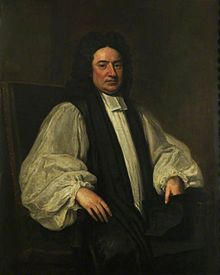George Smalridge

George Smalridge (alias Smallridge; 18 May 1662 – 27 September 1719) was Bishop of Bristol (1714–1719).
Life
Smalridge was born at Lichfield, son of the Sheriff of Lichfield Thomas Smalridge, George received his early education, this being completed at Westminster School and at Christ Church, Oxford.[1]
His political opinions were largely modelled on those of his friend
regius professor of divinity at Oxford; his Jacobite opinions, however, prevented him from securing this position when it fell vacant in 1707.[1]
In 1711, he was made dean of
lord almoner to the king.[1]
The bishop was esteemed by
Dr Johnson declared his sermons to be of the highest class.[1]
Works
- Sixty Sermons, preached on Several Occasions, 1726. Other editions 1827, 1832, 1853 and 1862.
- The Life of Grabe[2]
References
- This article incorporates text from a publication now in the public domain: Chisholm, Hugh, ed. (1911). "Smalridge, George". Encyclopædia Britannica. Vol. 25 (11th ed.). Cambridge University Press. p. 249.
Further reading
- William Gibson, 'Altitudinarian Equivocation: George Smalridge's Churchmanship', in Gibson & Ingram, eds., Religious Identities in Britain, 1660-1832, Ashgate, 2005
- Richard Sharp, 'Smalridge, George (1662–1719)', Oxford Dictionary of National Biography, Oxford University Press, 2004, accessed 12 Jan 2009
